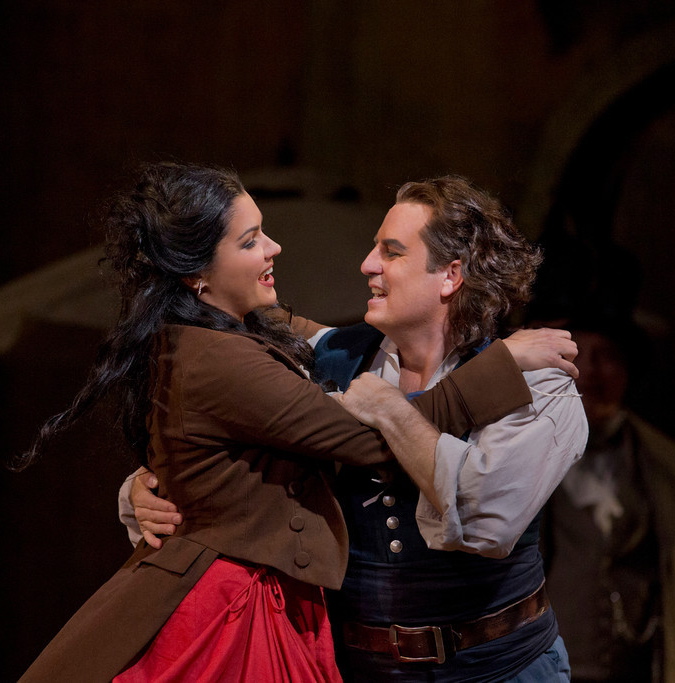Met opens new season with a safe and charmless “Elixir”

Anna Netrebko as Adina and Matthew Polenzani as Nemorino in Donizetti’s “L’Elisir d’Amore.” Photo: Ken Howard/Metropolitan Opera
The Metropolitan Opera opened its new season on Monday evening with a new production of L’elisir d’amore.
It’s not clear why.
As recently as six months ago the old John Copley staging proved one of last season’s runaway delights when Diana Damrau and Juan Diego Florez lit up Donizetti’s romantic comedy with superb singing and acting. In comparison, Anna Netrebko’s pitchy vocals and Matthew Polenzani’s cautious performance made opening night sound decidedly second-rate.
The new production by Bartlett Sher with sets by Michael Yeargan and costumes by Catherine Zuber offered little to justify its expense. Sher seems to have a winning attention to detail—the sort that finds things for singers to do with their hands and props—but no overarching concept. His decision to set the action in a small Italian town in the early days of the Risorgimento (Donizetti places it in a Basque village) had little dramatic effect beyond turning Sergeant Belcore into a mildly villainous Austrian.
The whole production was colored by an aesthetic sensibility that lacked verve and ambition. The old production’s toothache-inducing pastel color palette was here replaced by pretty painterly sets that seemed to stem from the same eagerness not to offend. So keen was Yeargan not to impose an original artistic vision on the opera that he says he sought inspiration from the work of mid-century scenic artist Oliver Messel. Zuber, meanwhile, copied freely from the costumes in Visconti’s Risorgimento films.
It’s one thing to present a historically respectful production of a nineteenth-century standard opera. But to furnish it with the borrowed visions of mid-twentieth-century film and stage designers—with the occasionally ironic quotation mark around a cardboard “tree” or “church”—is to shirk artistic responsibility. By taking refuge in the fluffy field of historiography, the Met now offers postmodernism to an audience that is rarely allowed to experience modernism in the first place.
Of course Mr Gelb, the Met’s general manager, must have been mindful of the fiasco three years ago when he chose Luc Bondy’s grim Tosca to open the season. And a stellar line-up of well-cast singers has a way of making any props and sets fade into the background. But Netrebko, who was hired for the part at least three years ago, is no longer the right artist for Donizetti’s light-footed bel canto.
Dramatically, Adina is a better fit for her than Anne Boleyn, a role she sang at last year’s season opener, and whose stiff costumes and depressing fate left little room for the Russian soprano’s naturally vivacious disposition to come out and play. But Monday night’s performance was marred by an undignified number of off-key notes and slurred embellishments. Too often it seemed as if Adina was the one who had been drinking the “elixir” with notes approached in the happy-go-lucky manner of a drunk stabbing at a keyhole.
The only true if quiet pleasures came from Polenzani, whose smooth, supple tenor fits Nemorino comfortably, as does his unflashy charisma. There have been more gladiatorial renditions of Una furtive lagrima, but Polenzani’s was delivered with tenderness and judicious phrasing, like an unvoiced prayer. In a cast of generally fine actors, he was the only one who convincingly acted with his voice, capable of turning a fortissimo into a pianissimo on a dime or of flattening his voice just enough to flesh out Nemorino’s drunkenness.
Ambrogio Maestri was a convincing Doctor Dulcamara with a buffo bass and rapid-fire diction. Mariusz Kwiecien returned to the Met as Sergeant Belcore with a somewhat colorless voice in the first act, but later warmed to the part of the dashing suitor for Adina’s hand. His duets with Polenzani held a nice dose of darkly charged energy.
Maurizio Benini conducted a creditable performance from the Met orchestra that included some memorably frenetic tempi but also allowed breathing room for Donizetti’s generous melodies. At the end of the performance the applause was loud and sustained, not least of all among those Met patrons who prefer their new productions not too new.
Performances of L’elisir d’amore continue from October 1 through 13 and will be reprised from January 30, 2013, through Febuary 9, 2013 with Erwin Schrott taking over the role of Dulcamara. metopera.org
Posted Sep 25, 2012 at 4:40 pm by Martin Bernheimer
Bravissima, whoever you are.
Posted Sep 26, 2012 at 2:31 pm by Eugene Neiman
Superb review. I listened to the Met Opera broadcast and heard what you heard. I appreciate your comments, especially, “(Netrebko’s singing) was marred by an undignified number of off-key notes and slurred embellishments. Too often it seemed as if Adina was the one who had been drinking the “elixir” with notes approached in the happy-go-lucky manner of a drunk stabbing at a keyhole” and “(the) quiet pleasures came from Polenzani”.